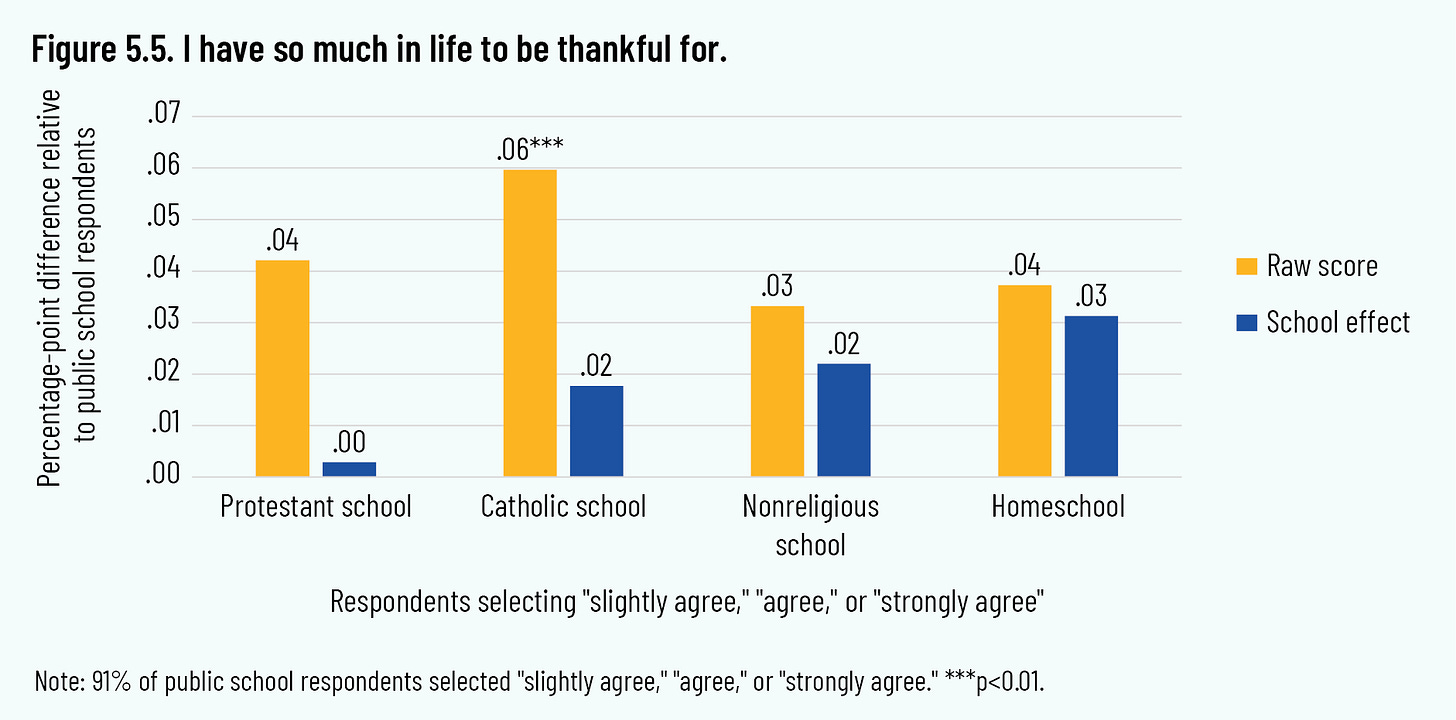Part 5 — Christian School Graduates: Mental Health and Well-Being
How Christian school graduates experience life satisfaction, emotional health, and social connection as adults.
This post is the fifth in a seven-part series unpacking the 2023 Cardus Education Survey. If you’re just joining the series, here’s a look at what we’ve covered so far:
Series Overview: Exploring the 2023 Cardus Education Survey
Part 1 — Introduction to the Study: What Difference Does Christian Education Make?
Part 2 — What Students Remember: The Christian High School Experience
Part 3 — Learning, Earning, and Serving: Long-Term Outcomes of Christian Education
Part 4 — Shaping Citizens: Civic Formation and Christian Education
→ Part 5 — Christian School Graduates: Mental Health and Well-Being (this post)
Part 6 — Faith and Family Formation
Part 7 — Reflections, Areas for Growth, and Next Steps
—
Conversations about student well-being have become front and center in education—especially in the wake of COVID-19. Mental health, once treated as peripheral to academic life, is now recognized as foundational to a young person’s ability to learn, relate, and thrive long-term. The 2023 Cardus Education Survey (CES) affirms this shift by including, for the first time, a series of measures related to mental health and overall well-being.
These new metrics go beyond mood or momentary emotions. They explore life satisfaction, anxiety and depression, optimism about the future, and the strength of social relationships. Together, they help paint a broader picture of how graduates are doing—not just in their careers or communities, but in their inner lives.
Let’s take a closer look at three dimensions of mental health and well-being from the CES data: life satisfaction, emotional health, and relationships.
Life Satisfaction
When asked how satisfied they are with life overall, adults who attended Protestant and Catholic schools report the highest average scores—slightly above their peers from public and nonreligious independent schools.
The survey used a standard five-question scale, measuring responses like “In most ways, my life is close to my ideal” and “If I could live my life over, I would change almost nothing.” On a 6-point scale, public school graduates averaged 3.99.
According to Figure 5.1, Protestant and Catholic school graduates scored slightly higher with their statisfaction with life, but the differences disappear after accounting for background factors like family income or parental education.
Still, the presence of those higher scores among faith-based graduates is worth noting. Satisfaction with life is a meaningful outcome, and it invites us to consider the deeper supports that may be embedded in Christian school culture.
Emotional Health: Depression and Anxiety
On more clinical measures—symptoms related to depression and anxiety—the survey tells a sobering but nuanced story.
Across most school sectors, scores are remarkably similar in Figure 5.2. But one group stands out: homeschool graduates. They reported significantly lower levels of depression and anxiety than all other sectors. On average, their scores were 0.28 points lower than public school graduates—a meaningful difference, especially after controlling for demographics.
This finding raises thoughtful questions about pace of life, stress exposure, and emotional safety during adolescence. While Christian school graduates do not show lower levels overall, it may signal an opportunity to look deeper at how we support the spiritual and mental health in our school environments.
Relational Well-Being: Closeness of Social Relationships
The CES also asked graduates to reflect on their closest relationships—their friendships, sense of community, and confidence in receiving help when needed.
In Figure 5.3, The average score for public school graduates was 4.19 out of 6. Catholic school graduates scored modestly higher, and no statistically significant differences were found for Protestant, independent, or homeschool graduates once background variables were controlled.
Still, the emphasis on belonging is critical. As with so many outcomes in this survey, relational well-being is often shaped by school culture. Mentorship, peer relationships, and healthy communities during high school may carry long-term relational value.
Optimism, Purpose, and Gratitude
Interestingly, homeschool graduates were more likely to agree with this statement in Figure 5.4—14 percentage points more likely than public school graduates. This suggests a complexity: while homeschoolers scored lowest in anxiety and depression, they may face distinct challenges in long-term direction-setting and vocational identity.
In Figure 5.5, Catholic school graduates were the most likely to agree with this statement (6 percentage points more than public school graduates), followed closely by other independent and Protestant school graduates. However, the difference was not statistically significant once background demographics were considered.
Finally, a hopeful note across all sectors: about 75 percent of graduates—regardless of school type—agreed with the statement “When I think about the future, I am positive.” That’s encouraging in a time when cultural narratives often suggest despair is the norm.
Final Thoughts
Mental health is complex, and no single factor—including school type—can fully determine a person’s well-being. But the Cardus Education Survey helps us see patterns and ask better questions.
Christian school graduates appear to experience life satisfaction and relational health at rates comparable to or above national averages, though these gains may be tied more to family context than school itself. At the same time, homeschool graduates stand out for lower anxiety and depression, even while reporting higher uncertainty about purpose and direction.
For Christian educators, these findings offer an invitation:
Do our classrooms and school activities cultivate peace and well-being, or just performance?
Do our students know that being successful in life is a great calling, but is it rooted in being known and loved by Christ?
Are we equipping students with tools to face challenges—not just moral clarity, but also inner resilience and relational support?
And are we, as adults, modeling what it looks like to live joyful, thankful, purpose-filled lives in Christ?
Coming next: Part 6 — Faith and Family Formation






